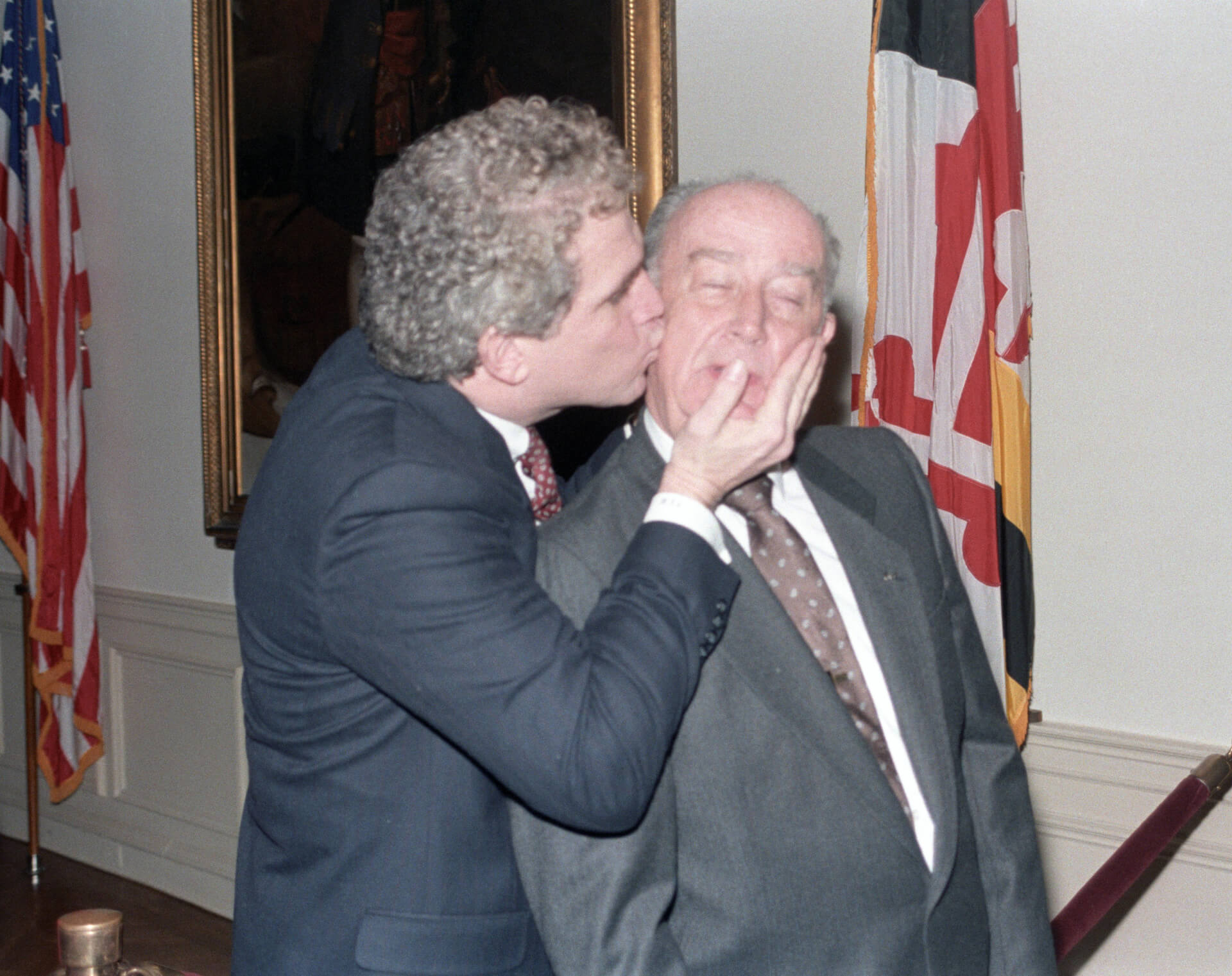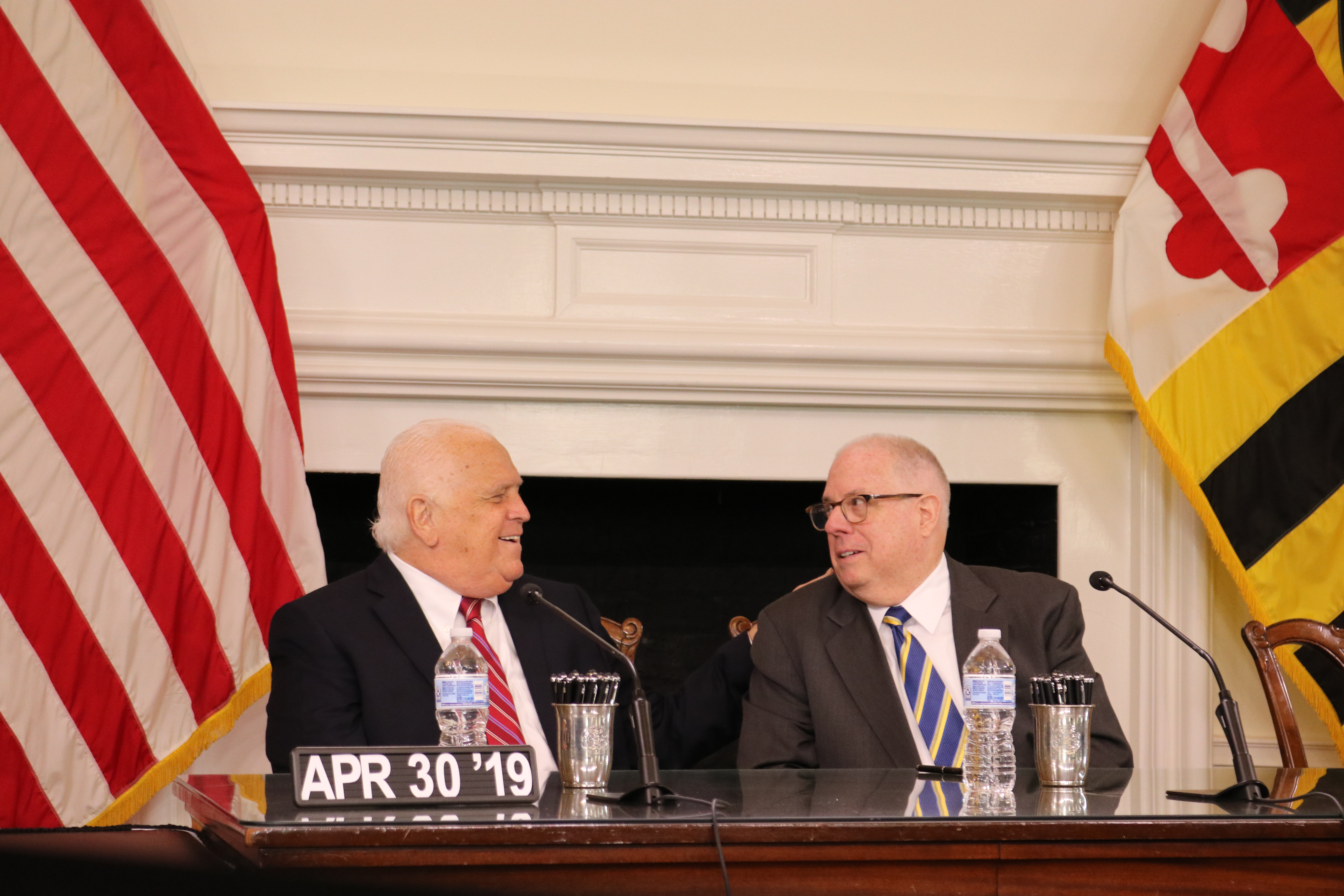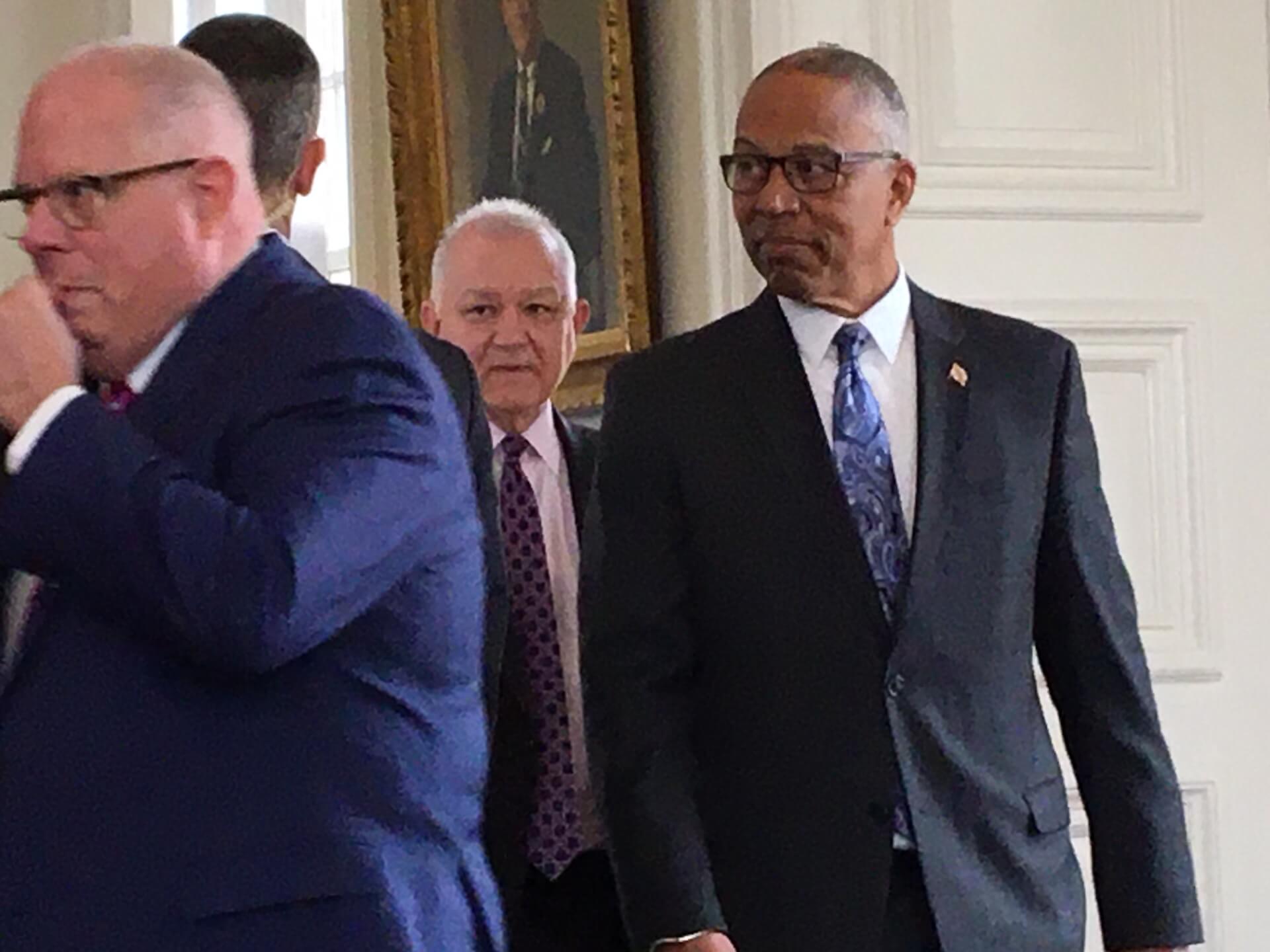Essay: Bookending Mike Miller’s Career as Senate President

Mike Miller could play a big room.
He was a big personality with a big smile.
He was complicated, a study in contrasts. Brash and humble, charming and petulant, stubborn and obliging, sentimental and savage. Handsome, well read and astute. With a hair-trigger temper. A frat boy and statesman, all at once.
Observers of the game loved him, though, in truth, not all. He could be a lightning rod, especially when blurts and utterances came spilling out of his mouth unexpectedly.
He seemed a throwback to the politics of old, at times skirting the societal limits of propriety that have evolved in the last 50 years with his comments.
He could be flirty with women ― some complained he was sexist ― and bawdy with the boys. He could curse like a sailor and yet raise the IQ level in the room, speaking eloquently about the nobility of public service.
To paint him as anachronistic, however, would not be an accurate assessment. He could not have survived politically all those years at the top of the food chain without adapting.
Above all else, he was a political animal ― 100 percent. He understood the whole of politics on some sort of primal or elemental level. It was in his wiring. He was a master tactician. He understood people and power. He understood the touch. He would grab your elbow or shoulder with affection, slap you on the back with a deep belly laugh. He understood accommodation, and he understood how to exercise the vise-grip of political persuasion. He’d bring a hydrogen bomb to a knife fight.
When the Maryland General Assembly convened last Wednesday, it was the first time in 50 years it had done so without Thomas V. Mike Miller Jr. seated in either the House of Delegates or Senate chambers. He presided over the latter as its president, elected by the members, for 33 years of the last half-century.
Miller, a Democrat who had represented Prince George’s and Calvert counties until stepping down Dec. 23 because of his declining health, died Friday of the cancer that he had fought for years. He was 78.
Although he had been failing in health, the fact that he is gone is still a shock. It is as if the last of an entire generation of political leaders who had guided the state to this point, had just passed before our eyes. There are still a couple of the old hands around, but only a couple.
Maybe we thought he would be president of the Maryland Senate forever ― or, if not at the podium, at least seated in the chamber.
But no man is bigger than the institution he serves.
***
As a reporter, I was lucky enough to cover Mike Miller both in the beginning of his record tenure as Senate president and at the end, with 18 years in the interim. It was an interesting metamorphosis to watch from the bookends of that career.

William F. Zorzi
The first time I went to talk to Mr. President for an extended interview, he was in his first year as the Senate’s presiding officer, 1987, though he had not yet emerged from the chrysalis as a statesman.
He had all the trappings of a statesman, however, and we met in his freshly renovated and richly appointed office on the first floor of the Maryland State House.
I sat across the desk from him, and he waxed on about the Civil War, as I recall, surrounded by shelves of books and more books ― mostly history and biography.
This was a sort of howdy-do, getting-to-know-you, with the requisite abbreviated foreplay before we got down to business. Unsurprisingly, our chat turned to the matter of politics, and he dropped the name of Lansdale G. Sasscer.
I must have stared back blankly.
“You don’t know who the hell Lansdale Sasscer is?”
I was beginning to feel like we were getting off on the wrong foot.
Sasscer, former president of the Maryland Senate and congressman, was once a powerful Democratic political boss from Upper Marlboro in Prince George’s County, from whence Miller hailed. This was the bare-knuckle political world in which Miller had come up, his neighborhood, down the country. Of course, he would react that way.
But what did I know about Southern Maryland? I was from Baltimore City. That was the center of the universe, where the votes were, where the money was, the power. Prince George’s County was the other side of the world, down there with that other backwater, Montgomery County.
I could have told him what I knew about the infamous “Ring” combine of U.S. Sen. Arthur Pue Gorman and I. Freeman Rasin, and how they ran the state back in the days of bossism, before the turn of the last century. I mean, Rasin was the city boss, but Gorman was from Howard County, which is, well, immediately next to Prince George’s, right? I could detail the rise and fall of James H. “Jack” Pollack or trace the trajectory of Irvin Kovens. Sure thing. Baltimore mayors, Maryland governors, attorneys general, no problem. But Sasscer? Lansdale Sasscer? Uh…. Not so much.
“You call yourself a political reporter?” he sniffed.
I had failed the first test. The bloom was off the Civil War rose.
Soon enough, the conversation turned to the real reason I was there ― what had been a surprise announcement by Gov. William Donald Schaefer, that he planned to build a 27-mile-long light-rail line from Anne Arundel County to Baltimore County, right through the center of Baltimore City, from Linthicum to Hunt Valley.
That was the day I learned a very important lesson, one that still occasionally seems to elude those on the second floor of the State House. That is, you never want to surprise the presiding officers of the Maryland General Assembly with anything, with any announcement, with any action by the governor, but especially if it has a $290 million price tag, and they’ve awakened to only find out about it on the front page of the daily newspaper.
Yeah. That’s kind of a problem.
“This governor needs to understand that this is not the Baltimore City Council, ready to approve whatever he wants, whenever he wants it,” Miller told me. Or words to that effect.
Anyway, as the interview progressed on the subject of Schaefer’s Trolley, as it was sometimes called, I could tell Mr. President was becoming more and more agitated (and animated), though he was keeping his cool. Relatively. As I mentioned before, the patina of statesmanship was still forming.
He said certain things about the governor, which seemed like fair game. Then, he began to complain about a certain Maryland secretary of Transportation. He called into question the man’s pedigree, his lineage. He suggested that perhaps the secretary had fallen off a pothole repair truck in the City of Baltimore and suffered, uh, a traumatic brain injury. As he shifted into overdrive, he then went on to suggest that the secretary should perform a generally viewed anatomically impossible act upon himself. He probably suggested this several times, as I recall. He might have suggested the governor do the same.
I told the president that I appreciated his studied insights, but that I really only needed a short quote from him, one that spoke to the light rail system’s chances for funding in the upcoming session of the legislature.
The president suggested that I should write exactly what he had said ― including, and maybe especially ― the part about the governor and Transportation secretary. I told him I wasn’t sure that my editors would allow such quotes in a family newspaper, editors being such spoilsports when it came to such things at the breakfast table.
Well, the president continued, he really didn’t give a flying fig ― I’m not sure that was the exact expression ― what he was quoted as saying in my newspaper. (He also might have used a few adjectives to describe the place of my employ.)
He then went on at some length about the proposed rail system, such as it is, and insisted on dragging the governor and Transportation secretary into it and through the mud. Repeatedly. I believe at this point he may have raised rhetorical questions about the governor’s personal habits and proclivities.
I reminded him again that I only needed a quick little quote to put next to his name, and he reminded me again that he did not give a flying fig ― I might not be remembering his expression exactly ― what I put in my newspaper, that if I wanted a quote from him, I should write exactly what he said.
There does come a time when you just have to step in and protect people from themselves. I believe this was one of those moments.
Eventually we got there, and I managed to cobble together a few quotes that passed the breakfast test in the paper the next day.
***
Everyone, it seems, has a Mike Miller story or two. He was a character.
Some of the tales are better known than others, such as the time during the 1987 Legislative Follies when he delivered a profane monologue on, among other things, the sex life of then-Governor Schaefer and the Gubernatorial First Friend, the improbably named Hilda Mae Snoops.
— Or the time that same year his secretary misread an invitation to the prestigious Gridiron Dinner in Washington as requiring “white attire” as the dress of the day, instead of just “white tie.” He turned up in white tie and tails, looking more like John Lennon on the cover of the “Abbey Road” album, while everyone else was in black tuxedoes. His detractors played that off, mistakenly, as his being a rube. Truth was, while a proud son of Clinton, Md., he was no Jethro from The Beverly Hillbillies.
— Or the time in 1989 when he told a Washington TV reporter that Baltimore was “a godamn ghetto” and “a war zone,” thinking that the interview had concluded and the camera was off. The TV reporter thought otherwise. That hard-to-live-down public assessment is said to have ended his aspirations for higher office right then and there.
Some of the best stories involved Parris N. Glendening, Miller’s one-time arch-enemy from the time when the former governor was Prince George’s County executive.

Senate President Thomas V. Mike Miller Jr. (D-Calvert) and Gov. Lawrence J. Hogan Jr. (R) share a laugh during a bill signing ceremony in Annapolis. Photo by Danielle E. Gaines.
The actual roots of the hostilities between the two men have all but been forgotten, but Miller, in 1989, decided he would introduce special “ethics” legislation, which applied solely to Prince George’s County and was designed to control political contributions from developers to County Council members and, in the end, Glendening.
Twice the legislation became law, only to be overturned by the Maryland Court of Appeals on technical points before Miller finally prevailed in 1993, the third time being the charm.
When Glendening announced he was running for the State House, Miller assessed the 1994 race by saying, “We need an honest governor, which rules out Parris.”
He later famously told a reporter, “Parris is like a baboon; the higher he climbs up the tree, the more you see of his ass.”
Mr. President generally toned down his rhetoric a bit after Glendening was elected, and worked to make the governor’s tenure a successful one, mostly out of loyalty to the Democratic Party, rather than any new-found affinity for the inhabitant of the second floor.
I missed the years where Miller did battle with Republican Gov. Robert L. Ehrlich Jr. for his four years upstairs and the two terms of Democratic Gov. Martin J. O’Malley that followed, including the heated and bitter fights over legalized slots, which he favored, with his House of Delegates counterpart, Speaker Michael E. Busch, another Democrat, who did not. And I missed the most of the sideline coverage of Miller during GOP Gov. Lawrence J. Hogan Jr.’s first term.
When I finally returned to Annapolis to cover the legislature for Maryland Matters in 2018, Miller had slowed down a bit, but not much. His hair then was without color ― he’d let it go completely white ― and he had grown a little beefier, as many of us had. But he hadn’t missed a step. He seemed as much in command of the chamber as ever.
It was still clear that he loved the Senate, his fiefdom, but more than that, he loved the game. Up at the podium, he made it all look easy, standing completely relaxed, when it was always a matter of planning and plotting, playing three-dimensional chess, always looking down the road.
Occasionally he would break into extemporaneous explanations or history lessons that were germane to a vote or a particular bill. The members apparently had grown accustomed to this momentary diversion, and no one thought it out of the ordinary.
I remember seeing him once stop a debate, just halt the goings-on on the floor. And no one challenged him. No one whipped out the Rules of the Senate or Robert’s Rules of Order. No objection at all. I looked around the chamber watching for reaction, hoping to catch an eye, but no one seemed to be particularly concerned or bothered by it. They just moved on to the next matter for consideration.
Other times, when things got a little heated on the floor, Miller would remind members from the podium, “This is the Senate of Maryland,” not unlike a Dad admonishing the children for exhibiting bad manners at the dinner table.
He also seemed to have added a new ending to each floor session that I didn’t remember him saying before: “Is there anything else for the good of the order?”
In the past, I thought Miller would just call directly on Sen. Clarence W. Blount, the Baltimore Democrat and his first and longest-serving majority leader, to end each legislative day, all the way through the end of session, until finally, “Mr. President, I move the Senate of Maryland stand adjourned sine die.”
So moved. And the gavel fell.




 Creative Commons Attribution
Creative Commons Attribution